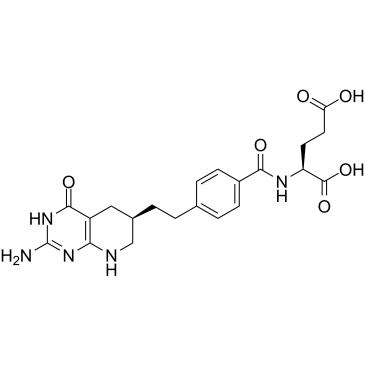106400-81-1
| Name | Lometrexol |
|---|---|
| Synonyms |
N-[4-[2-[[(6R)-2-Amino-3,4,5,6,7,8-hexahydro-4-oxopyrido[2,3-d]pyrimidin]-6-yl]ethyl]benzoyl]-L-glutamic acid
L-Glutamic acid,N-(4-(2-(2-amino-1,4,5,6,7,8-hexahydro-4-oxopyrido(2,3-D)pyrimidin-6-yl)ethyl)benzoyl)-,(R) Lometrexolum [inn-latin] (R)-6-DDATHF L-Glutamic acid,N-(4-(2-((6R)-2-amino-1,4,5,6,7,8-hexahydro-4-oxopyrido(2,3-D)pyrimidin-6-yl)ethyl)benzoyl) (6R)-5,10-dideaza-5,6,7,8-tetrahydrofolic acid N-[4-[2-[[(R)-2-Amino-4-oxo-1,4,5,6,7,8-hexahydropyrido[2,3-d]pyrimidin]-6-yl]ethyl]benzoyl]-L-glutamic acid |
| Description | Lometrexol (DDATHF), an antipurine antifolate, can inhibit the activity of glycinamide ribonucleotide formyltransferase (GARFT) by tightly binding with it. Lometrexol can further inhibit de novo purine synthesis, causing abnormal cell proliferation and apoptosis, even cell cycle arrest. Lometrexol has anticancer activity[1]. |
|---|---|
| Related Catalog | |
| Target |
Antifolate and GARFT[1] |
| In Vitro | Lometrexol (DDATHF) induces abnormal proliferation and apoptosis exist in neural tube defects (NTDs)[1]. Lometrexol significantly reduces the expression of PH3[1]. |
| In Vivo | Lometrexol (DDATHF; i.p.; 15-60 mg/kg; on gestation day 7.5) increases the rate of embryonic resorption and growth retardation in a dose-dependent manner[1]. Lometrexol (i.p.; 40 mg/kg) maximally inhibits GARFT activity after at 6 hours and thereafter gradually increases with time but remains significantly lower than control even at 96 hours. Levels of ATP, GTP, dATP and dGTP of NTDs embryonic brain tissue decreases significantly at 6 h, and more significantly over time[1]. Animal Model: C57BL/6 mice (7-8 week, 18-20 g)[1] Dosage: 15, 30, 35, 40, 45 and 60 mg/kg Administration: Intraperitoneal injection; on gestation day 7.5 Result: Increased the rate of embryonic resorption and growth retardation in a dose-dependent manner. |
| References |
| Density | 1.56g/cm3 |
|---|---|
| Molecular Formula | C21H25N5O6 |
| Molecular Weight | 443.45300 |
| Exact Mass | 443.18000 |
| PSA | 187.50000 |
| LogP | 1.72700 |
| Index of Refraction | 1.709 |
| Storage condition | 2-8°C |
| Hazard Codes | T |
|---|
